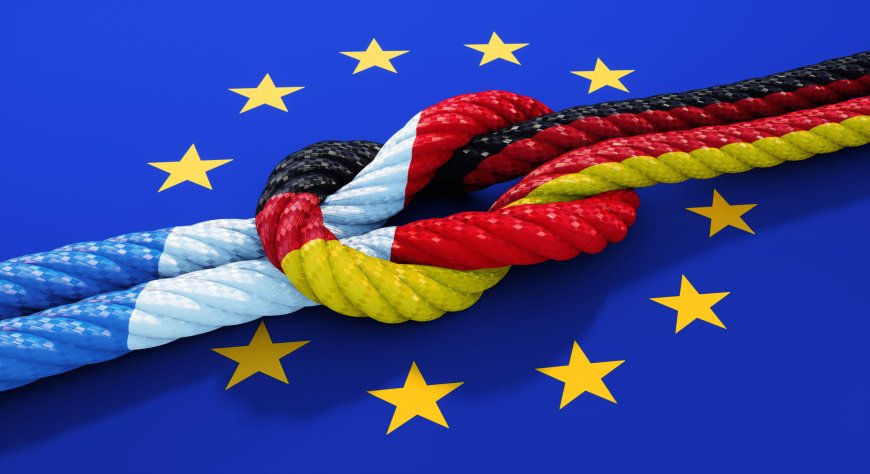Paris and Berlin are doomed to alliance
Paris and Berlin are doomed to alliance

60 years ago, on 22 January 1963, the countries Germany and France sealed their reconciliation[i] after many difficult wars. At the signing, Charles de Gaulle spoke with a "full heart" of the "immense importance" of the occasion for Europe and the world; equally moved, German Chancellor Konrad Adenauer said: "Mr President, you have expressed the sentiments and feelings so accurately that I need add nothing: every word you have said corresponds to our will and our understanding."
The Alliance is not in the best side
Now it's Emmanuel Macron and Olaf Scholz's turn[ii], but somehow the engine no longer runs smoothly. The brittle Hanseatic and the flamboyant Northern Frenchman are finding it difficult to find common ground. Yet they are pursuing a similar - similarly cautious - course towards Kiev in the Ukraine war. There was dissonance on the subject of the energy price cap or nuclear power. When Scholz launched his "double whammy", people on the Seine in Paris would have liked to know what the German chancellor was aiming for with the 200 billion euros, but he kept a low profile.
On the Berlin Spree, on the other hand, Macron caused displeasure when he allowed the French national debt to escalate to over 115 percent of the gross domestic product; and instead of turning off the money tap and fighting inflation, the spendthrift Élysée ruler simply wants to change the deficit and debt rules.
Lack of coordination
Macron's delivery[iii] of light armoured personnel carriers to Ukraine was also not coordinated with Berlin. It increases the pressure on Scholz to follow suit. In the past, still in Merkel's time, it would have been a matter of course to coordinate in advance. Merkel's chancellery would not have launched a "turnaround" without consulting Paris. The cordiality of 1963 has suffered, discords and misunderstandings are multiplying. Last October, Macron's collar burst when Scholz launched his European Sky Shield Initiative (ESSI) without the usual consultation with Paris. Paris was not included in the air defence shield against Russian missiles - unthinkable for France, the EU pioneer that prides itself on the largest army in the Union.
Macron reacted sensitively and unceremoniously cancelled a long-planned Franco-German government meeting in Fontainebleau. The scandal had an impact. Macron went one better: he told Scholz that Germany had "isolated itself" on the energy price issue. As usual, Berlin and Paris soon tried to repair the rifts. The joint government meeting was put back on the agenda. So now the German and French governments will meet in coming time at the Sorbonne University in Paris to celebrate the 60th anniversary of the Élysée Treaty.
New, old divergences
But Paris also remains frustrated by the persistence of this strategic divergence. Conservative MP Jean-Louis Thériot, Vice-President of the Defence Commission of the French National Assembly, recently stated anew that Germany[iv] was "not really striving for a European defence", but rather trying to place itself under the "American umbrella".
However, these differences are by no means new. Already in the Élysée Treaty, de Gaulle had caused the USA, Great Britain and Nato not to even be mentioned as allies - as if there were no Western defence alliance. The Bundestag in Bonn corrected this view unilaterally: it ratified the Franco-German agreement by adding a preamble for the German side in which the Federal Republic declared its commitment to the Atlantic Pact with the USA and Nato. De Gaulle was already in a huff again. Nevertheless, the friendship treaty held. For the Germans as well as the French, the advantages outweighed the disadvantages, namely the formation of a core relationship in the heart of Europe that no one was to bypass.
By: H. Paazooki
[i] https://www.lpb-bw.de/elysee-vertrag
[ii] https://www.bundesregierung.de/breg-en/news/ceremony-elysee-treaty-2159338
[iii] https://www.politico.eu/article/emmanuel-macron-sending-western-tanks-to-ukraine-amx-10-rc-volodymyr-zelenskyy/
[iv] https://www.derstandard.at/story/2000142684867/60-jahre-elysee-vertrag-paris-und-berlin-sind-zur-allianz













































